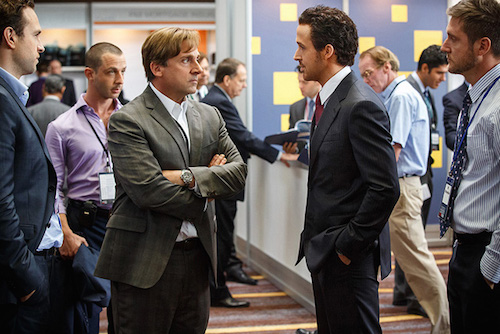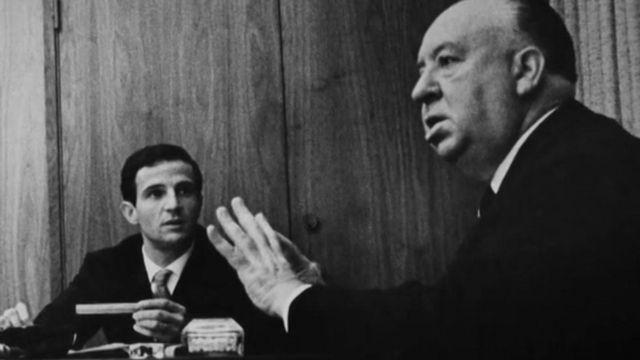Synopsis: Four outsiders in the world of high-finance who predicted the credit and housing bubble collapse of the mid-2000s decide to take on the big banks for their lack of foresight and greed.
Release Date: December 23, 2015 MPAA Rating: PG-13
Genre(s): Biography, Drama
Film Review

Production
At first, one would not think that a movie about the housing market crash of 2008 would be all that entertaining. However, as The Big Short proves, anyone who would think that would be wrong.

The Big Short focuses on a handful of bankers and/or analysts who all saw the crash coming and exploited it to their advantage. After spending hours studying thousands of individual mortgage transactions, Dr. Michael Burry (Christian Bale from American Hustle and The Dark Knight Rises) notices a pattern of banks bundling loans together to increase their cumulative credit rating. Believing this to be a fragile way of doing business, he bets against the banks, knowing that he stands to make millions once the bottom falls out of the market. A banker named Jared Vennett (Drive‘s Ryan Gosling) catches wind of this scheme and, once he crunches some numbers and figures out that the data is correct, convinces hedge-fund manager Mark Baum (Steve Carell from “The Office”) and his team of hotshot analysts to invest against the banks as well. Meanwhile, a pair of upstart money managers named Jamie Shipley (Finn Wittrock from “All My Children” and “American Horror Story”) and Charlie Geller (John Magaro from Not Fade Away and Unbroken) stumble upon the plan and enlist the help of their mentor, retired banker/current environmental nihilist Ben Rickert (Fury‘s Brad Pitt), to place their own bet against Wall Street. If and when the inevitable crash comes, all of these players will become very rich, but at what cost?
With a director like Adam McKay, who has been behind such riotous comedies as Anchorman: The Legend of Ron Burgundy and Step Brothers, at the helm, it would almost be expected that The Big Short would be a slapstick comedy, especially with the name Steve Carell on its poster. In fact, it’s quite the opposite; the script, based on the book The Big Short: Inside the Doomsday Machine by author Michael Lewis (Moneyball, The Blind Side) and adapted for the screen by McKay and Charles Randolph (The Life of David Gale, Love & Other Drugs), tells quite a serious story. The multiple interweaving storylines coalesce into one single narrative, and it’s a frustrating, maddening one. And that is meant in the best possible way, as a movie about millions of people losing their homes should be both frustrating and maddening.
None of that is to say that The Big Short is not fun to watch. It’s an extremely clever and witty film, way more amusing than a movie about real estate banking has any right to be. Adam McKay actually gets around the stuffiness of the subject matter with a series of ingenious celebrity cameos that pop up every now and again to define all of the dull and drab banking concepts – Margot Robbie drinking champagne in a bubblebath explains sub-prime mortgage-backed securities, Anthony Bourdain compares collateralized debt obligation to a seafood stew, and Selina Gomez uses a blackjack table in a casino to illustrate synthetic CDO’s. These little sequences are better than a thousand Schoolhouse Rock shorts.
In the end, The Big Short has no heroes. Even the protagonists are seen as bad people, profiting off of the misfortune of millions of naïve homeowners. The lone voice of humanity is Brad Pitt’s Ben Rickert, who despite his righteousness (or maybe because of it), comes off as the eternal pessimist amongst the star-struck gold-diggers. The only winners to be found are the viewers, because The Big Short is more entertaining than a car crash.

Editing
One of the elements of The Big Short that keeps it so lively and light-hearted is the editing. With the help of editor Hank Corwin (The Tree of Life, Natural Born Killers), Adam McKay keeps the pace of the film quick without ever making it feel to frenetic; it’s a Wall Street-type of a feel, but it doesn’t rob the audience of its breath. There are essentially four different stories going on in four different camps throughout the movie, and Corwin weaves them together seamlessly into one coherent and enjoyable movie. The transitions are brilliantly creative as well, showing flashes of pop culture imagery like television commercials or news footage to denote the passage of time. The whole editorial style of the movie falls somewhere between classic MTV shorts and NBC’s “The Office,” looking hip and young while still staying accessible to the generally uncool masses. Between the slick editing and the celebrity cameo educational segments, The Big Short manages to make investment banking look cool.
Cast and Crew
- Director(s): Adam McKay
- Producer(s): Dede GardnerJeremy KleinerArnon MilchanBrad Pitt
- Screenwriter(s): Charles RandolphAdam McKay
- Story: Michael Lewis
- Cast: Ryan Gosling (Jared Vennett)Christian Bale (Michael Burry)Steve Carell (Mark Baum) Marisa Tomei (Cynthia Baum)Rafe Spall (Danny Moses)Hamish Linklater (Porter Collins)Jeremy Strong (Vinnie Daniel)Finn Wittrock (Jamie Shipley)John Magaro (Charlie Geller)Brad Pitt (Ben Rickert)Melissa Leo (Georgia Hale)Karen Gillan (Evie)
- Editor(s): Hank Corwin
- Cinematographer: Barry Ackroyd
- Production Designer(s):
- Costume Designer: Susan Matheson
- Casting Director(s): Kathy DriscollFrancine Maisler
- Music Score: Nicholas Britell
- Music Performed By:
- Country Of Origin: USA
